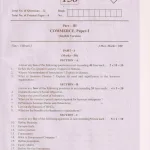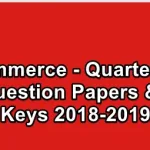11th Public Commerce Question Paper 2019
Preparing for the 11th commerce exams requires a clear understanding of important questions and their solutions. This guide provides a comprehensive set of questions and answers across all subjects to help students understand concepts and perform well in exams.
Accountancy
Question: What is the meaning of accounting?
Answer:
Accounting is the process of recording, summarizing, analyzing, and reporting financial transactions of a business to provide insights into its financial status.
Question: Define journal.
Answer:
A journal is a book of original entry where financial transactions are recorded in chronological order before being posted to ledger accounts.
Question: What is a ledger?
Answer:
A ledger is the principal book where all the accounts of a business are maintained, showing the effect of transactions on each account.
Question: Explain trial balance.
Answer:
A trial balance is a statement that lists all ledger account balances to check the mathematical accuracy of the bookkeeping entries.
Question: What is depreciation?
Answer:
Depreciation is the systematic allocation of the cost of a tangible asset over its useful life to account for wear and tear.
Question: Define double-entry system.
Answer:
The double-entry system is a method of bookkeeping where every transaction affects at least two accounts, with equal debit and credit entries.
Question: What is bank reconciliation?
Answer:
Bank reconciliation is the process of matching a company’s bank statement with its own accounting records to identify discrepancies.
Question: Explain the term capital.
Answer:
Capital refers to the financial resources invested by the owner in a business for its establishment and operation.
Question: What is goodwill?
Answer:
Goodwill is an intangible asset representing the reputation, brand value, or customer loyalty of a business that increases its earning potential.
Question: Define balance sheet.
Answer:
A balance sheet is a financial statement that shows a company’s assets, liabilities, and equity at a specific point in time.
Question: What are liabilities?
Answer:
Liabilities are obligations that a business owes to external parties, such as loans, creditors, or unpaid bills.
Question: What is a partnership?
Answer:
A partnership is a legal agreement between two or more persons who agree to share the profits and losses of a business.
Question: Define fixed assets.
Answer:
Fixed assets are long-term tangible assets such as land, buildings, and machinery, used in the operations of a business.
Question: What is revenue?
Answer:
Revenue is the income generated by a business from its normal operations, such as sales or services provided.
Question: Explain cash flow statement.
Answer:
A cash flow statement is a financial document that shows the inflows and outflows of cash within a business over a specific period.
Question: Define accrual basis of accounting.
Answer:
The accrual basis of accounting records revenues and expenses when they are earned or incurred, regardless of when cash is received or paid.
Question: What is a contingent liability?
Answer:
A contingent liability is a potential obligation that may arise depending on the outcome of a future event.
Question: Explain accounting standards.
Answer:
Accounting standards are guidelines issued by regulatory bodies to ensure consistency and transparency in financial reporting.
Question: What is profit and loss account?
Answer:
A profit and loss account is a financial statement that shows the revenues and expenses of a business, determining its net profit or loss.
Business Studies
Question: What is business?
Answer:
Business is an economic activity that involves the production, distribution, and exchange of goods and services for profit.
Question: Define management.
Answer:
Management is the process of planning, organizing, directing, and controlling resources to achieve organizational goals effectively and efficiently.
Question: Explain the term entrepreneur.
Answer:
An entrepreneur is an individual who initiates, organizes, and operates a business, taking on financial risks to make profits.
Question: What is globalization?
Answer:
Globalization refers to the process of increased interconnectedness and interdependence among countries, driven by trade, investment, and technology.
Question: Define sole proprietorship.
Answer:
A sole proprietorship is a type of business owned and managed by a single individual who assumes all risks and profits.
Question: What is corporate social responsibility?
Answer:
Corporate social responsibility (CSR) is a business’s commitment to act ethically and contribute to economic, social, and environmental sustainability.
Question: Explain market segmentation.
Answer:
Market segmentation is the process of dividing a market into distinct groups of consumers with similar needs or characteristics.
Question: What is a cooperative society?
Answer:
A cooperative society is an organization owned and operated by a group of individuals for their mutual benefit.
Question: Define business ethics.
Answer:
Business ethics refers to the moral principles and values that guide the behavior of individuals and organizations in business.
Question: What is e-commerce?
Answer:
E-commerce is the buying and selling of goods and services over the internet using digital platforms.
Question: Explain SWOT analysis.
Answer:
SWOT analysis is a strategic planning tool used to identify an organization’s strengths, weaknesses, opportunities, and threats.
Question: What is a joint-stock company?
Answer:
A joint-stock company is a business organization where capital is divided into shares, and ownership is shared among shareholders.
Question: Define delegation of authority.
Answer:
Delegation of authority involves assigning responsibility and authority to subordinates to accomplish specific tasks.
Question: What is the importance of communication in business?
Answer:
Communication is vital in business as it ensures clarity, coordination, decision-making, and relationship building among stakeholders.
Question: Explain total quality management (TQM).
Answer:
TQM is a management approach focused on improving quality across all organizational processes to meet customer expectations.
Question: Define logistics.
Answer:
Logistics involves the planning, implementation, and control of the movement and storage of goods and services from origin to destination.
Question: What is industrialization?
Answer:
Industrialization is the process of developing industries in an economy, leading to large-scale production and economic growth.
Question: Explain working capital.
Answer:
Working capital is the difference between a company’s current assets and current liabilities, used to fund day-to-day operations.
Question: What is digital marketing?
Answer:
Digital marketing is the promotion of products or services using digital channels such as social media, search engines, and email.
Question: Define business cycle.
Answer:
The business cycle refers to the fluctuations in economic activity over time, characterized by periods of expansion and contraction.
…Continue with other subjects such as Economics, Mathematics, and Statistics with similar structure…
Understanding concepts clearly is essential for excelling in commerce exams. These questions and answers provide a structured way for students to learn and revise critical topics effectively. Preparing thoroughly can significantly enhance confidence and performance.
Latest Posts
- Step-by-step guide to download and apply for jee mains admit card 202
- Comprehensive 2025 government holidays and recruitment details for job seekers
- JEE Mains Admit Card 2025: Your Step-by-Step Guide to Downloading the Hall Ticket
- Everything You Need to Know About 2025 Government Holidays Recruitment
- Comprehensive Guide to rrb d group recruitment 2025 – Eligibility, Vacancies, and Application
- Detailed guide to nps trust recruitment 2025 vacancies, eligibility and apply process
- Comprehensive guide to hpcl recruitment 2025 notification, vacancies, and application process
- ignou bed admission 2025 complete recruitment guide with eligibility and process
- Comprehensive Guide to Indian Army Agniveer Recruitment 2025 Notification and Jobs
- Everything You Must Know About CBSE Board Exams 2025 Changes & New Rules






